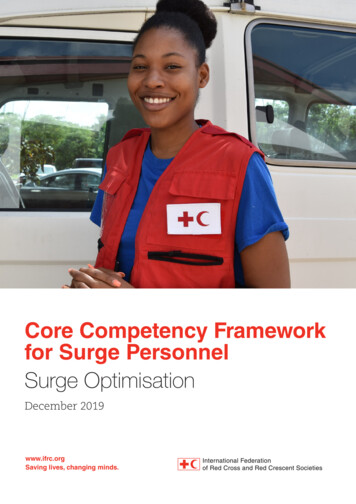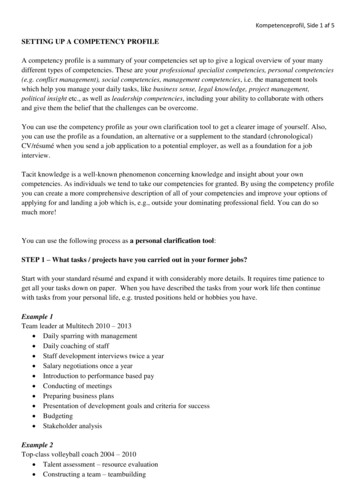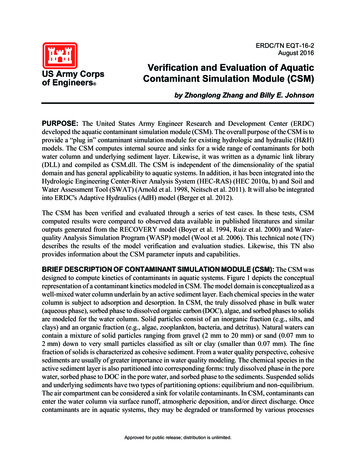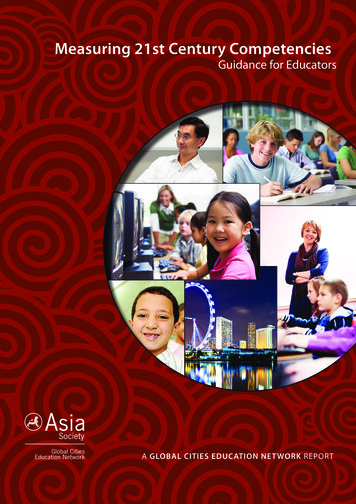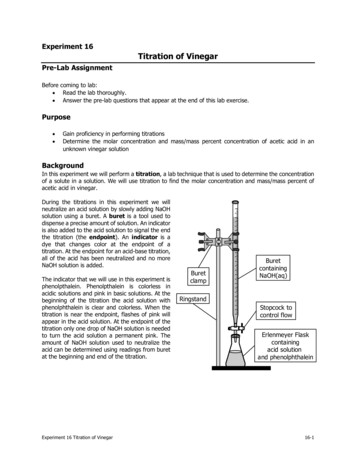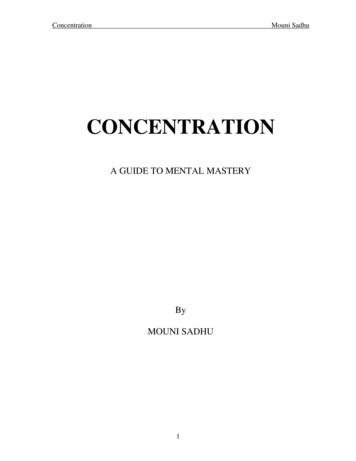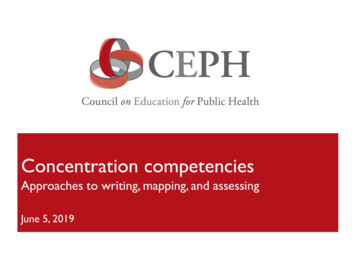
Transcription
Concentration competenciesApproaches to writing, mapping, and assessingJune 5, 2019
All participantswill be muted.So if you have aquestion, enterit here!CEPH staff willsee it and willread and answerquestions live atthe end of thepresentation!
Continuing education Up to 1.0 CPH recertification credit may be earnedat this event
Availability of slides & recording
Today’s presenters. CEPH introduction Mercer University New York University Hawaii Pacific University
D4. Concentration Competencies (SPH/PHP)B2. Competencies (SBP)MPH & DrPH& SBPApplies to allconcentrationsand generalistdegreesAt Least 5(SPH/PHP)or 3 (SBP)ConcentrationCompetenciesArticulates depthin concentrationarea or fine at leastone for eachcompetencyValidationBy facultyor otherqualifiedindividual
What makes a good concentration comp? Written at level appropriate to the degree Defines scope of skill BEYOND the foundationalknowledge & comps in D1 & D2 (or B2 for SBP) Deeper, more advanced level (verb must bedifferent!) Area not covered at all in foundational
What do you think? Develop an appropriate advocacy-based responseto address a specific community health challenge orneed. Foundational competency #14: Advocate for political, social, or economic policiesand programs that will improve health in diversepopulations
More advanced examplesFoundational competency #14: Advocate for political, social or economic policiesand programs that will improve health in diversepopulations Develop an advocacy tool or plan to address publichealth issues and concerns Translate research findings into a proposal andpresentation for a legislative audience
What do you think? Evaluate the services available through major MCHprograms recognizing their limitations and gaps
What do you think? Develop written and oral presentations ofstatistical data analysis related to public healthissues
Comparison to FC 19 Develop written and oral presentations of statisticaldata analysis related to public health issuesFoundational competency #19: Communicate audience-appropriate public healthcontent, both in writing and through oralpresentation
More advanced examplesFoundational competency #19: Communicate audience-appropriate public health content, both inwriting and through oral presentation Demonstrate oral presentation skills to inform and persuade anaudience using statistical data analysis Interpret and communicate the results, strengths, and limitations ofstatistical data analysis related to public health issues
What do you think? Demonstrate the ability to identify the mostcommon health behavior theories Apply a health behavior theory in the development of ahealth promotion program Use the social ecological model to address a socialdeterminant of health
What do you think? Apply quality and performance improvementconcepts to address organization performanceissuesBuilds appropriately on foundational competency #10 Explain basic principles and tools of budget and resourcemanagement
D4. Concentration Competencies (SPH/PHP)B2. Competencies (SBP)MPH & DrPH& SBPApplies to allconcentrationsand generalistdegreesAt Least 5(SPH/PHP)or 3 (SBP)ConcentrationCompetenciesArticulates depthin concentrationarea or fine at leastone for eachcompetencyValidationBy facultyor otherqualifiedindividual
Provide detail in the templateCompetencyCourse number(s) and name(s)Specific assignment(s) that allow assessmentDemonstrate oral presentation skills to MPH 756: Advanced Statisticalinform and persuade an audience using Computingstatistical data analysisFinal presentation: Students present the results of theirdata analyses related to their research question. Studentsare assessed on their ability to create and deliver apresentation that concisely and effectively summarizestheir data in a manner that is easily understood by variousaudiences.Translate research findings into aproposal and presentation for alegislative audienceHLTH 6232: Health CommunicationFinal project: Students write a letter to a local officialand deliver and record a real or mock public healthbriefing. Published data must be cited as part of thestudent’s position.Apply a health behavior theory in thedevelopment of a health promotionprogramSBS 650: Community Health AnalysisAssignment 2: Students create a health promotionintervention that focuses on a specific population, setting,and health problem based on results of a needs analysis.Students must apply a theory such as the transtheoreticalmodel, health belief model, social cognitive theory, or socialecological model.
Syllabus validationTranslate research findings into a proposal and presentationfor a legislative audienceHLTH 6232 Health Communication syllabus excerpt:
Template D4-1: completed exampleAssessment of Competencies for MPH in Global HealthCompetencyCourse number(s) and name(s)1. Analyze the roles, relationships, &resources of the entities influencingglobal health2. Apply monitoring & eval techniquesto global health programs, policies, &outcomesSpecific assignment(s) that allow assessmentOnline discussion posts: Students respond to questionprompts about the key stakeholders that influence global health.Questions require students to analyze roles, relationships, andresources. [Questions listed on last page of syllabus]MPH 650: Program Planning for Global Final project: Students perform monitoring and evaluation ofa global health program to assess impacts on policies andHealthoutcomesMPH 602: Critical Issues in GlobalHealth3. Propose sustainable multi-sectoralMPH 602: Critical Issues in Globalinterventions, in conjunction with local HealthpartnersIntervention proposal: Students must meet with at least twolocal partners to seek feedback on intervention strategies. Thenstudents propose a feasible intervention that factors in multiplesectors4. Design sustainable workforce devMPH 713: Monitoring & Evaluation forstrategies for resource-limited settings Global HealthTrain the trainer project: Students use data from focusgroups and a needs assessment to design ongoing, low-costtraining programs for community health workersFinal paper: Section 5 of the final paper requires students tocite at least four examples of opportunities they had to practicecultural humility and ongoing learning in a global health setting.They must reflect on what they did well and areas forimprovement5. Display critical self-reflection, cultural MPH 710: Professional Development,humility, & ongoing learning in globalCultural Competencies & Ethicshealth
Cheryl Gaddis, DrPH, MPH, CHES
Mercer UniversityMPH Program Summary Degrees– MPH (Online, In-Person, Hybrid) Combined Degrees (PharmD, MMSc, PsyD, DPT)– BSPH (In-Person)– 8 PIF Student Enrollment– MPH Online – 34 Hybrid - 26 In-Person - 79– BSPH 84 students
Generalist to Diverse Populationsand Health Equity Rationale– Change in CEPH Foundational Competencies– Change in location of the MPH program fromMacon to Atlanta.
Refining Competencies andAssessment Development Process for refining competencies– Mapping of competencies to foundational competencies– Review of literature to develop new competencies– Determination of appropriate courses Process for assessment development– Development of two new courses– Individual faculty assessment development– Iterative review of assessments
Diverse Populations and Health EquityCompetencies Analyze theoretical frameworks for disparity causation Describe actions needed to build internal infrastructure toadvance health equity in organizations Evaluate empowerment strategies for viability in diversecommunities including disparate, rural, and aging populations Develop community capacity for leadership among diversepopulations Engage stakeholders to develop the action model/changemodel schemas to build sustainable programs and systems invulnerable communities
Concentration Specific Courses MPH 730 Introductory Program Evaluation MPH 739 Diverse Populations MPH 740 Health Equity
Diverse Populations and Health EquityCompetenciesAssessment of Competencies for MPH in Diverse Populations and Health EquityCompetencyCoursenumber(s)or name(s)Specific assignment(s) that allow assessment25. Evaluateempowerment strategiesfor viability in diversecommunities includingdisparate, rural, andaging populationsMPH 740HealthEquityMPH 740: Empowerment Assignment: Identify anempowerment strategy that has beenimplemented by an organization. Evaluate thestrategy for viability using guidance from theCochrane Update article. Grading rubric is inAppendix B.
Challenges, Successes, andRecommendations Challenges– Ensuring that the new competencies were significantlydifferent from the CEPH MPH Foundational Competencies.– Building on the foundational competencies. Success– Approval from CEPH! Recommendations– Identify a distinct concentration that builds upon thefoundational competencies.– Start early to allow time for many rounds of review andchanges
THANK YOU!For More Information:Cheryl L. R. Gaddis, DrPH, MPH, CHES ,Associate Professor of Practice and Director, Master of Public HealthProgramCollege of Health Professions3001 Mercer University DriveAtlanta, GA 30341-4155678-547-6464gaddis cr@mercer.eduhttp://chp.mercer.edu
Cheryl Merzel, DrPH,MPH
New York University College of Global Public Health Located in New York City MPH program accredited in 1971 College approved by NYU Board of Trustees in June 2015 CEPH site visit for accreditation as new SPH based onnew criteria conducted in November 2018 Review by Council – June 2019
College of Global Public HealthAY 2018-19Degrees offeredNumber3StudentsMPH503MA in Bioethics39PhD in Public Health27MPH concentrations10Primary Instructional Faculty54
MPH Concentration Competencies Timeline & ProcessSpring 2017Each MPH concentration asked to: Identify concentration specific competencies & map toconcentration courses Develop/revise syllabi to incorporate relevant competenciesand assessment activitiesFall 2017 & Spring 2018 Accreditation team conducted detailed review of syllabi toensure competencies addressed and assessed Worked closely with faculty to address any issues Accreditation team completed Template D4-1, for review byconcentration faculty
Timeline & Process, continuedSummer 2018 Asked concentrations for refinements to competenciesand/or assessments based on mock site visit and CEPHfeedback on preliminary self-studyFall 2018 Submission of final self-study (October) Faculty prep for site visit Site visit (November)Spring 2019 Accreditation team worked with concentration faculty toaddress site visit feedback on competencies, prior toCouncil Meeting
Example 1REFINING THE COMPETENCYMAPEpidemiology Concentration
Refining the competency map for EpidemiologyTemplate D4-1dAssessment of Competencies for MPH in Epidemiology ConcentrationCompetencyCourse number(s)or othereducationalrequirements1. Identify methods for measuring theGPH-GU 2450distribution of determinants of health outcomes Intermediateand well-being within and across populationsEpidemiologySpecific assignment(s) that allowassessmentHW 1: Measures of diseasefrequencyHW 2: Design issues inobservational studiesHW 3: Field evaluation of vaccineeffectivenessHW 4: Bivariable analysis in STATAHW 5: ConfoundingHW 6: Agreement andmisclassificationMidterm ExamFinal ExamGPH-GU 2930Epidemiology Design& MethodsSyllabus includes competencies notassigned to courseGPH-GU 2160Qualitative & FieldMethodsCompetency not addressedADDED:GPH-GU 2225PsychometricMeasurement &Analysis in PublicHealth Research &PracticePresentation and Research Paper
Example 2SITE VISIT FINDING:OVERLAP WITH FOUNDATIONALCOMPETENCIESSocial & Behavioral SciencesConcentration
Social & Behavioral Sciences Competencies (original)1.Critically assess the literature related to social and behavioral aspectsof health2.Explain major theories, trends, and debates in the social andbehavioral sciences literature regarding health3.Assess the means by which structural bias & social inequitiesundermine health and create challenges to achieving health equity atthe behavioral, community, and societal levels4.Apply the methods and analytic tools of social and behavioral scienceto design, implement, and analyze evaluation or research studies5.Apply ethical principles to public health research and evaluation6.Disseminate research findings to diverse audience
Addressing overlap with foundational competenciesSocial & Behavioral Sciences ConcentrationFoundationalCompetencyOriginal SBSCompetencyRevised SBSCompetencyCompetencyAssessmentDiscuss the means bywhich structural bias,social inequities andracism underminehealth and createchallenges toachieving healthequity atorganizational,community andsocietal levels (FC #6)Assess the means bywhich structural bias& social inequitiesundermine health &create challenges toachieving healthequity at thebehavioral,community & societallevels (SBS C #3)Critically evaluate theanalytic tools that canbe used to studystructural bias andsocial inequities, bothin terms of theirpredictive utility andin terms ofapproaches such asmulti-level models(SBS C #3)Course: GPH-GU2960 Theories inPublic HealthPractice, Policy,and ResearchCommunicateaudience-appropriatepublic health content,both in writing andthrough oralpresentation (FC #19)Disseminate research Delete SBS-specificfindings to diversecompetency. Coveredaudiences (SBS C #6) in other courses.Assessment: Annotatedbibliography Mid term Final paperNot applicable
Example 3SITE VISIT FINDING:CANNOT VALIDATECOMPETENCY ASSESSMENTPublic Health Management Concentration
Public Health Management Competencies1.Analyze the main components and challenges in theorganization, financing, and delivery of health care and publichealth services2.Describe the legal basis for public health and health services3.Apply principles of leadership and management to work withand across organizations, sectors, and agencies4.Apply the principles and tools of budgeting and resourcemanagement to improve the performance of public health andhealth care delivery organizations5.Apply principles of strategic management to public health
Addressing CNV for competency assessmentPublic Health Management ConcentrationCompetency #3 Apply principles of leadership and managementto work within and across organizations, sectors and agenciesRevised assignments in GPH-GU 2294 Designing and ManagingOrganizations in Public Health to better align with the competencyCompetency #5 Apply principles of strategic management topublic healthAssigned an additional course to address the competency (GPH-GU2294 Designing & Managing Organizations in Public Health) with anew assignment added
SummaryChallenges Time consuming and detail-intensive process of workingwith faculty to refine competency maps and assessmentsSuccesses Increased faculty appreciation of competency assessmentTips Have a core team of faculty and staff to review andprovide ongoing feedback and assistance Importance of collegiality, communication, & capacitybuilding
Thank you!Feel free to contact me:cheryl.merzel@nyu.edu
Hawaiʻi Pacific UniversityPublic Health ProgramEmily K. Roberson, PhD, MPHAssistant Professor of Public Health
Public Health Program Summary Information Public Health Program within theCollege of Health & SocietyTotal students: Bachelor of Science in Public Health (BSPH)BSPH students: 60*80 Traditional, online, and evening classes Master of Public Health (MPH) Fully online; accelerated and hybrid options Four Primary Instructional FacultyMPH students:20
MPH Generalist Concentration Competencies1) Assess the public health implications of the environmental conditions,political landscape, population characteristics and movement, andvulnerabilities and capacities unique to Hawai‘i and the Pacific Region.2) Design an original research study, including instrument development,sample selection, and analysis plan.3) Apply Geographic Information Systems techniques to health data,including joining data, manipulating layers, and creating maps.4) Assess the unique physical, mental, and occupational health aspectsassociated with military service.5) Evaluate the significance of diseases that thrive in the tropics andsubtropics with a focus on the Pacific Region.
Concentration Competency DevelopmentProcess Series of departmental brainstorming sessions1. Formed and solidified program guiding statements Parallel setting of priority populations, diversity & inclusion goals2. Mapped program guiding statements to CEPH foundationalcompetencies and existing course content Looked for gaps, unique / special features of our program Developed assessments concurrently
Concentration Competency DevelopmentProcessHawaiʻi Pacific University ValuesThe faculty, staff, students, and overall university community of Hawai‘i Pacificembrace the following values as representative of the spiritual, ethical, andphilosophical principles that support our community, as well as of the aspirationalideals to which we collectively aspire.PONO, meaning righteous, honest and moral, and an energy of necessity.KULEANA, meaning responsibility and rights, and concern for all interests,property, and people.ALOHA, meaning hello, goodbye, love, kindness and grace, unity, humility,patience and waiting for the right moment.
Concentration Competency DevelopmentProcessHawai‘i Pacific University Public Health Department VisionOur vision is robust health throughout Hawai‘i, the Pacific region, and the world,achieved through broad institutional and community collaboration.Hawai‘i Pacific University Public Health Department MissionOur mission is to promote health locally, nationally, regionally, and globally throughinnovative educational and experiential opportunities for our students, bysupporting our faculty in teaching excellence and scholarship, and as communitypartners in public health in Hawai‘i and the Pacific region.
Concentration Competency DevelopmentProcess Hawaiʻi Pacific University Public Health Department PriorityPopulations: Residents of Hawai‘i and the Pacific Region, especiallyunderrepresented minority populations Nontraditional and first-generation college students Military-affiliated students, including active duty, veterans, anddependents
MPH Generalist Concentration Competencies1) Assess the public health implications of the environmental conditions,political landscape, population characteristics and movement, andvulnerabilities and capacities unique to Hawai‘i and the Pacific Region.2) Design an original research study, including instrument development,sample selection, and analysis plan.3) Apply Geographic Information Systems techniques to health data,including joining data, manipulating layers, and creating maps.4) Assess the unique physical, mental, and occupational health aspectsassociated with military service.5) Evaluate the significance of diseases that thrive in the tropics andsubtropics with a focus on the Pacific Region.
MPH Generalist Concentration Competencies1) Assess the public health implications of the environmental conditions,political landscape, population characteristics and movement, andvulnerabilities and capacities unique to Hawai‘i and the Pacific Region.2) Design an original research study, including instrument development,sample selection, and analysis plan.3) Apply Geographic Information Systems techniques to health data,including joining data, manipulating layers, and creating maps.4) Assess the unique physical, mental, and occupational health aspectsassociated with military service.5) Evaluate the significance of diseases that thrive in the tropics andsubtropics with a focus on the Pacific Region.
Summary Challenge: Avoiding overloading courses with competencies Success: Clearly aligned program values, vision, mission, and diversityand inclusion plan with course offerings and content Bonus: Helps to answer the question, “Why choose us?” Tip: Get creative! Who has room in one of their courses to try something new / different /innovative? How can we maximize the potential of each assessment? You don’t need to place each competency in the obvious course.
Emily K. Roberson, PhD, MPH Assistant Professor of Public HealthDepartment of Public Health College of Health and Society Hawaiʻi Pacific University45-045 Kamehameha Highway, Kāneʻohe, HI 808-265-8839 eroberson@hpu.edu
Thank you, presenters!
HousekeepingUpcoming trainingsAOWAugust 1-2Washington, DCTA webinar:Bachelor’s CurriculumAugust 92-3pm ETCEPH Accreditation &Education ForumNovember 2Philadelphia, PAhttps://ceph.org/about/dates-to-remember/
Attendee questions?
New York University . College of Global Public Health Located in New York City MPH program accredited in 1971 College approved by NYU Board of Trustees in June 2015 CEPH site visit for accreditation as new SPH based on new criteria conducted in November 2018 Review by Council - June 2019





